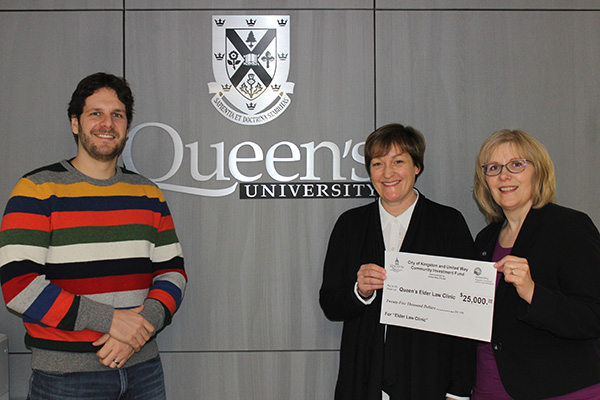A boost for Queen's Elder Law Clinic
February 7, 2017
Share

One of the only clinics of its kind in Canada, the Queen’s Elder Law Clinic (QELC), has received a $25,000 grant from the United Way.
The funding will enable the clinic to provide help to a greater number of Kingston-area seniors while also providing students more experiential learning opportunities.
“The clinic has grown substantially, to the point that it now requires a full-time director,” says Christian Hurley, the director of QELC and the Queen’s Business Law Clinic (QBLC).
Blair Hicks joined QELC last May on a part-time basis as review counsel. Thanks to the charity’s funding, she will assume the role of director in April. This will enable Hurley to focus his full-time efforts on QBLC, which is also rapidly expanding.
“I’ll be able to pass the torch to her,” Hurley says. “It’s going to enable the Elder Law Clinic to grow at a quicker pace and pursue other avenues available to us.”
It also means the clinic, which dealt with 102 separate matters for 69 clients in 2016, can bring on more students and increase its visibility.
Hicks runs her own estate planning practice in Kingston and works with issues related to elder law every day.
“I come from an education background so I enjoy working with students and seeing the progress people make when they are learning a new skill,” she says. “It was an easy fit.”
The clinic deals with a wide range of issues affecting seniors and regularly assists their clients to prepare wills, powers of attorney and guardianship applications. QELC students are often asked to help their clients understand their legal rights and obligations in a number of different contexts.
“It’s not boxed in, per se. It’s a broad area of law,” Hurley says. “We also give presentations to stakeholders in the community.”
These include care workers, doctors, nurses, social workers and the Kingston Police.
QELC is also teaming up with the Queen’s Prison Law Clinic to provide legal assistance to older inmates, which Hurley chalks up as a product of the collaborative workspace at Queen’s Law Clinics.
“While inmates are incarcerated, they often need someone to help with their outside affairs. Preparing a power of attorney can address this issue; however, many inmates do not have the means necessary to retain a lawyer to do this sort of work,” Hurley says.
Hurley applied for the grant in October, and pitched QELC’s case to the United Way in November. He was advised that the application was approved just before the holidays.
“It’s a very popular clinic. Last year we received applications from 54 students seeking one of the eight available caseworker positions,” he says.
Thanks to the grant from the United Way, QELC is now in a position to expand its enrolment, which will help it to meet the growing demand.